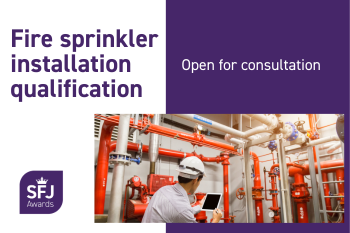Designing and developing new qualifications is a key aspect of our work as a leading awarding organisation in England. With expertise across a range of sectors, including fire and rescue, policing, security and more, our product development team work hard to ensure our qualifications fulfil the needs of learners.
How do we go about creating training for complex and heavily regulated protective services? We spoke to Andy Costello, Qualifications and Assessment Product Manager, to find out more about the process.
What is the starting point of the process for developing new qualifications in England?
The development of a new qualification can be triggered by a variety of factors. These factors include new legislation or changes in the way that a sector operates, advances in technology that impact practice, identification of a gap in the market, and the requirement for impartial accreditation of skills or knowledge training. Additionally, there may be a need to formalise learning and development within a sector.
The starting point for us at SFJ Awards is to gather information to create a business case. Depending on the sector and subject area this involves a range of activities such as:
- Engagement with stakeholders to gather feedback and determine demand.
- Reviews of the performance of other qualifications and products.
- Reviews of any new ways of working in the sector or changes in legislation that governs practice.
Following this, we have an internal approval process to ensure that the products we develop are going to have a demonstrable impact for the sectors we work with.
Relationships and communication are key to the development and delivery of all our qualifications.
How do you go about getting engagement from the sector and onboarding subject matter experts to contribute?
As a specialist awarding organisation, we frequently already have a range of associates with the right expertise to help us on most developments. This network is also crucial for us when we move into new areas as it allows us, through recommendation, to identify those in the sector with relevant expertise.
When onboarding new subject matter experts (SMEs) we check individuals’ CVs and discuss their experience to ensure that they are the right fit for the project. In some cases, we’ll provide some training for new associates, for example on writing good assessment questions.
We also have networks of employer contacts who we invite to form part of an expert working group. Our working groups are often made up of representatives of regulatory bodies, practitioners, and those with responsibility for learning and development functions within employers in the sector.
How do you then work with the expert groups to design the content of the qualification?
The first thing we do is identify the purpose of a qualification. We will often gather information about the purpose at business case, but our working group will help us to refine it. Having a clear purpose is very important, it’s the thing that keeps us on track in terms of what we are trying to achieve.
We will often conduct surveys with the wider sector and then discuss feedback and outcomes with a working group that meets either in person or virtually.
The working group shape the content and areas that the qualification will assess. These groups give us valuable insight into the key areas for assessment and how content may need to differ to cover different employer and stakeholder requirements. Different requirements can be accommodated through the use of pathways or optional units.
At the end of the development process, it is important that everyone agrees that the qualification will meet the purpose we identified a need for.
Once a qualification has been developed, how do you go about getting formal approval from the governing body or government?
As a regulated awarding organisation, we add the qualification to the relevant register, which is the Ofqual Register in England. Our development processes are aligned to the standards but, before we add any qualification to the register, we go through a series of checks to ensure that our development has fulfilled all the relevant regulatory requirements.
With most qualifications that we offer, we are pre-approved (by virtue of being an Ofqual recognised awarding organisation) to add them to the register and begin delivery. There are certain qualifications, however, where an approval is necessary from a regulator, so where this is the case there may be a specific process and timelines that we must follow.
So, the qualification is approved and signed off – what’s next?
We plan for and launch the qualification. This involves getting the message out to stakeholders through email, social media, and events.
Centres must gain approval from us in order to offer new qualifications. Our approval process involves checks to confirm that a centre has the capacity and expertise to deliver the qualification. Our Quality Assurance team support centres that might not be quite ready to deliver a qualification. This enables the centre to put processes and resources in place to ensure that they are delivering to the right standard. We monitor delivery to make sure that our qualifications are delivered consistently across different centres. This is an important factor that means anyone achieving the qualification has been trained to a consistent standard.
Once a qualification is up and running, our focus is then on maintenance of that qualification. We have areas for our centres to feedback and will occasionally make changes and updates to ensure that our products work for our customers and remain fit for purpose. We also review performance data on a regular basis and gather stakeholder feedback through surveys, engagement activities and day to day interaction with our centres. Our strategic networks help to alert us when there are changes in practice like the introduction of new technology or changes to legislation.
Through these touchpoints we are able to ensure the qualifications we offer not only meet the needs of learners and employers, but are maintained to the highest standards, incorporating the latest information and best practice.
About SFJ Awards
SFJ Awards has developed hundreds of qualifications and are specialists in supporting skills development for the public sector. Explore our qualifications and get in touch with us today.





